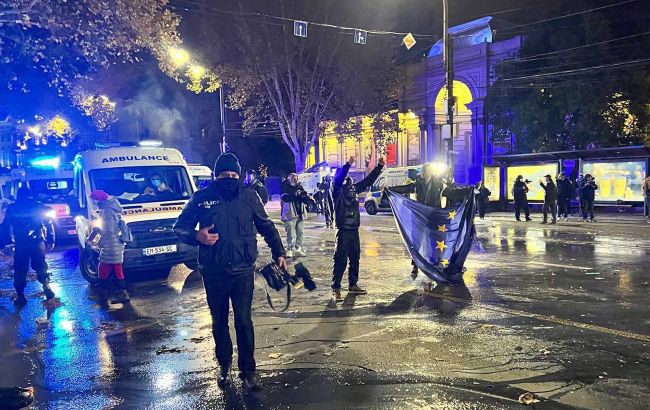Tbilisi police breaking up protest, casualties and arrested reported
 Photo: Protests in the center of Tbilisi turned violent (t.me/NGnewsgeorgia)
Photo: Protests in the center of Tbilisi turned violent (t.me/NGnewsgeorgia)
In the center of the Georgian capital, Tbilisi, violent clashes erupted between law enforcement officers and protest participants. The escalation followed the newly elected parliament's decision to abandon negotiations on Georgia’s accession to the European Union, Newsgeorgia reports.
In the evening, thousands gathered near the headquarters of the ruling party, Georgian Dream, and the parliament building in Tbilisi to protest the parliament's decision, which they argued violated the country's Constitution.
Around midnight (Georgian time), clashes broke out between protesters and law enforcement as people attempted to break into the parliament building from Chichinadze Street. The police deployed several smoke grenades into the crowd.
Law enforcement attempted to push protesters away from the service entrance towards Rustaveli Avenue.
Demonstrators held a line and resisted. Shouts of "monsters," "slaves," and "Russians" were directed at the police.
The situation on Chichinadze Street rapidly escalated. What triggered the confrontation remains unclear. Hundreds of police officers, including special forces, were deployed to the entrance.
Later, Georgian President Salome Zourabichvili joined the protest on Rustaveli Avenue. She stood between the protesters and law enforcement and attempted to speak with them.
"Whom do you serve? Why? For which government are you working?" she said.
The protesters eventually advanced towards the special forces. Among them were women and children.
The Ministry of Internal Affairs stated that the protest "exceeded legal limits," and special measures were used in response. Three police officers were reported injured. The number of injuries among protesters remains unknown.
At 2:26 AM Georgian time, Georgian special forces deployed smoke grenades and tear gas against the protesters. Law enforcement also used water cannons.
Security forces were concentrated at the main protest site on Shota Rustaveli Avenue, dispersing the crowds.
As of 2:45 AM Georgian time, law enforcement cleared the area near the Georgian parliament.
After the dispersal on Rustaveli Avenue, protesters erected symbolic barricades. The area in front of the parliament is now under the control of special forces.
Later, law enforcement began aggressively detaining protesters.
Updated
In central Tbilisi, special forces continue to disperse the protest forcibly.
Tear gas and water cannons are being used against the protesters.
Law enforcement is also using chemical substances. The Association of Young Lawyers is demanding that the Ministry of Internal Affairs disclose the details of the substances being used.
People remain on Shota Rustaveli Avenue, singing the Georgian national anthem.
Law enforcement has pushed some of the protesters onto the surrounding streets.
Protesters are attempting to rebuild barricades, but special forces are dismantling them with water cannons. Rustaveli Avenue resembles a battlefield.
Updated 3:24 AM (Kyiv time)
Law enforcement has again deployed water cannons on central Shota Rustaveli Avenue.
Special forces are using tear gas against the protesters and are detaining those who refuse to leave the area. There are reports of injuries.
The dispersal of the protest in central Tbilisi has been ongoing for several hours. It is now 5:30 AM in the Georgian capital.
Updated 6:44 AM
A new protest has been scheduled for 7:00 PM today, November 29, on Rustaveli Avenue in Tbilisi.
Georgian President Salome Zourabichvili expects a "strong reaction" from European leaders to the violent dispersal of the protest in Tbilisi.
"It's time for our EU partners to speak out," the president wrote on her social media page on X.
Zourabichvili noted that at the time of writing the post (6:30 AM Tbilisi time), "protests and repression are still ongoing in central Tbilisi" and that "journalists and political leaders are targeted."
Zourabichvili herself attended the protest before the dispersal and tried to convince the special forces not to use force against the demonstrators.
Statement of the Georgian Foreign Ministry
Meanwhile, 78 employees of Georgia’s Ministry of Foreign Affairs signed a statement opposing the government's decision to freeze the country’s EU accession talks until 2028.
The statement argues that Georgia’s withdrawal from EU accession negotiations contradicts the country’s strategic interests.
It highlights that international political developments drive the current wave of EU expansion and represent an unprecedented historical opportunity for Georgia. The country’s rejection of this opportunity would lead to negative strategic consequences, and such an opportunity may never arise again.
The diplomats’ statement reads that delaying the negotiation process would isolate the country and, without support from Western partners, Georgia would face threats, particularly amid ongoing geopolitical processes.
Georgia's parliamentary election and protests
At the end of October, parliamentary elections were held in Georgia. Irregularities were reported at numerous polling stations, including ballot stuffing.
The ruling party, Georgian Dream, won the election with 54% of the vote. Four opposition parties gained more than 5% of the vote and entered parliament, but they refused to recognize the election results as legitimate.
Since early November, opposition party leaders and citizens have staged mass protests in central Tbilisi. President Salome Zourabichvili also refused to recognize the parliamentary election results.
On Thursday, November 28, Georgian Prime Minister Irakli Kobakhidze announced the decision to halt negotiations for Georgia’s EU accession until the end of 2028. The government also rejected EU budget grants.
This sparked a new wave of intense protests in central Tbilisi.

